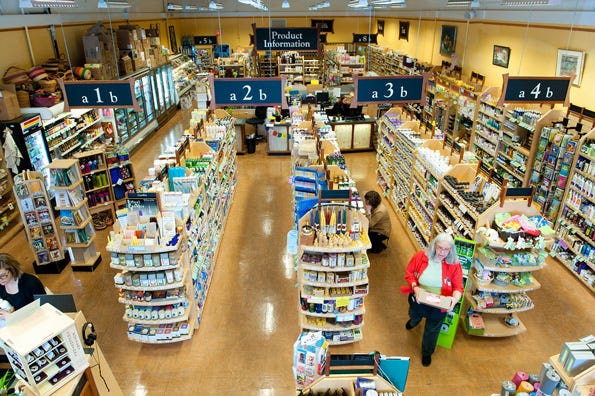March 10, 2015


After owning a health food store in the 1970s and then leaving to earn his MBA, Norman Dill returned to retail in 1987, opening Rebecca’s Natural Food in Charlottesville, Virginia. Business was solid for a few years. But then Dill suddenly faced a problem many independents today know well but that wasn’t yet common in the early ’90s: Whole Foods Market opened nearby. Seeing his food sales suffer, Dill decided to retool Rebecca’s, shifting the store’s focus to products and services that the national chain didn’t provide. The revamp worked. Now, more than 20 years later, Rebecca’s remains a thriving center of health and wellness that more than holds its own against the competition. Dill shares with NFM his keys to success.
Whole Foods came to Charlottesville early in its growth. How did you retool to stay afloat?
Norman Dill: It was one of the first Whole Foods stores to come to a small city, and it really hurt our grocery, produce, meat and dairy sales. We were right on the verge of not making it. So we started emphasizing vitamins and supplements more. Supplements went from 10 percent of our sales to 50 percent. That’s still about where we are today.
Impressive! Sounds like a successful switch.
ND: It was, but the key change was when we made a commitment to always having very knowledgeable employees on hand who could talk about supplements. We began offering employees insurance, vacation time and IRAs to make working at Rebecca’s a career for our core people. As a result, at least five people have been with us for more than 15 years. Those core employees can talk about real issues with shoppers and have gathered a loyal following. They also have good relationships with local alternative health practitioners.
How do you go about building a knowledgeable staff?
ND: I look for people who are familiar with specific areas such Ayurveda or homeopathy, but prior knowledge isn’t always necessary. The key things are having a passion for healthy living and an interest in learning. Yes, it’s important that our employees be knowledgeable, but we also want them to help create an enjoyable vibe in the store. When they really care about what we are doing, that adds so much to our business. We know that customers don’t have to come here—they just really want to.
In what other ways do you differentiate from today’s ever-increasing competition?
ND: Even Kroger next door has a natural foods section that’s bigger than our entire store, so it’s hard to compete on items like soymilk. So we really try to emphasize products customers can’t get elsewhere. We try to be cutting-edge with local—pasture-raised eggs, meats, cheeses, fermented products. Our customers all shop at other local food stores as well, and that’s OK. In fact, when Whole Foods recently relocated to just blocks away from us and Trader Joe’s opened across the street from it, we were worried. But neither really affected us at all.
How have natural products shoppers changed over the years?
ND: One big change I’ve noticed in recent years is that shoppers are a lot more interested in their general lifestyles. Rather than looking at supplements therapeutically and coming in only when they have the flu, they’re focusing on eating a healthy diet and sticking to a vitamin routine. This trend is a sign to me that wecan offer so much by having personal contact with people. Rather than just selling products, we’re inspiring them and giving them the confidence to better their lives.
What’s next for Rebecca’s?
ND: Going forward, we’ll really emphasize working with more local producers and distributors. We also want to get more local producers to make items that we can sell under the Rebecca’s name—we’d like become more of a destination because of our own-brand products. We just launched a line of soaps made in Charlottesville that has sold very well. In fact, body care was our fastest-growing department in 2014, so we’ll also emphasize that more.
3 ways to thrive despite competition

Follow Norman Dill's tips:
Brand local products. Selling small, local producers’ goods under your brand name can be a win-win for both parties. You can help them grow their business while you build up your selection of unique products that customers will come to know you for.
Befriend the competition. Your competitors could actually send business your way. “We have Whole Foods, Trader Joe’s and a few other natural independents in town, and we specialize in different things,” Dill says. “We are all very friendly with one another. Whole Foods recommends our store all the time because we have a much larger supplements department.”
Be firm but flexible. “We have very high product standards and many absolutes such as no GMOs in food,” Dill says. “However, with produce, in order to support local, we really can’t be absolute about certified organic, because so many Virginia growers just can’t get certified. We’d rather offer an apple or peach right off the tree.” Fresh and local will likely lure shoppers.
About the Author
You May Also Like
.png?width=700&auto=webp&quality=80&disable=upscale)



